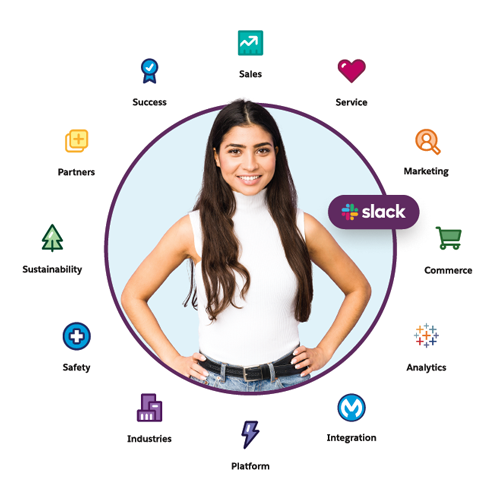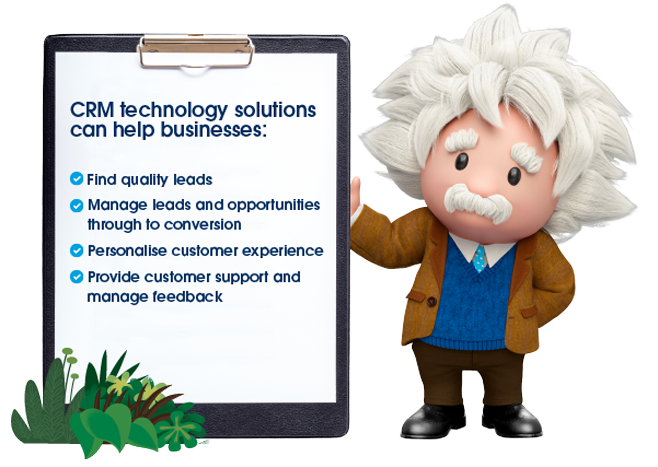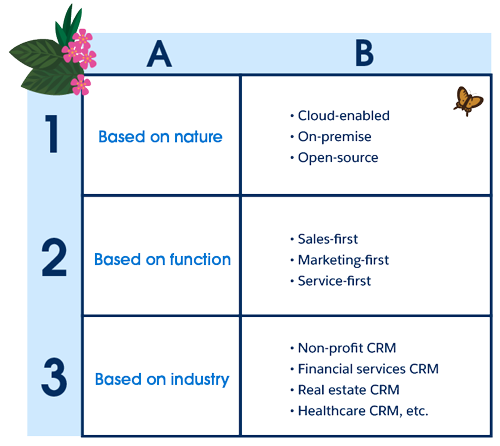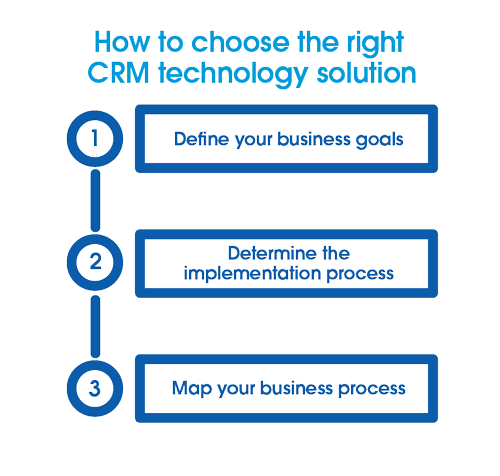Introduction
The success of your business depends on how deeply you understand your customers and quickly meet their needs. Maintaining and growing strong customer relationships is an important aspect that is directly influenced by how you serve them and boost satisfaction. This is where CRM comes into play.
CRM stands for customer relationship management. It can be one or all of the following: processes, strategies, and technologies used by businesses to efficiently manage interactions with customers, leads, and prospects. Initially built as a basic sales force management tool, CRM technology quickly became an effective tool for businesses to understand their customers and improve their experience. This helps businesses like yours build customer loyalty, retain more customers, and ultimately grow revenue.
A customer-centric approach to doing business
Customer relationship management helps customer-centric businesses successfully win and keep customers for life.
To successfully deliver offerings customers will love, you need to have a proper strategy and plan in place. When you put customers at the centre of your business, you can build strategies and offerings that aim to improve customers’ lives while driving business success.
No machine can replace the human mind’s capability to understand other people and build effective business strategies. But that said, today’s technology can enhance human potential. The right CRM technology and tools can take care of manual processes and help your teams focus on high-value activities that require a human touch. It can also help you manage customer feedback and knowledge resources better to always provide customers with the right answers and solutions.
What is CRM technology, and what does it do?
The basic function of CRM technology is gathering and storing data. More sophisticated software also enables data analysis, providing insights to help grow customer satisfaction.
CRM technology helps you consolidate, unify, and centralise all the important customer information and company data in one place. This includes information such as:
- Name, contact number, email address, home and work addresses, social media handles, birthdays, contact lists, etc.
- Prospect and customer interaction details – like conversations across touchpoints, meetings, etc.
- History of products and services availed, frequency and the value of purchases, preferences, payment modes
- Engagement metrics like page visits, clicks, etc. on your brand’s website, app, sales, and marketing campaigns
- Returns or exchange requests, complaints, and feedback

Customer data is central to CRM technology and allows you to accurately understand customers, predict their needs, and fulfil them. Also, with the use of CRM technology and tools, you can digitise or automate crucial business processes, like:
- Consolidating leads and qualifying them
- Following up, by setting up auto-responses or reminders
- Processing orders and payments
- Engaging customers through sales and marketing campaigns, measuring their performance
- Providing customer support and online services, etc.
Additionally, CRM solutions also provide actionable analytics across departments based on the centralised data. This helps you tie together different functions and teams to deliver better customer experiences.
CRM basics: Things CRM technology can help you do
Finding quality leads
Managing leads and opportunities through to conversion
Personalising customer experience
Providing customer support and managing feedback

Types of CRM technology
There are all kinds of CRM technologies available in the market today based on operating systems, business function, and industry-specific needs.
Here are the three main types of CRM technology systems:
1. Cloud-based CRM technology
These CRM applications use cloud computing to store and process the data gathered. This is one of the most popular types of CRM as it allows businesses the freedom to access all of their data and communicate with internal teams, partners, and customers without the need for any on-premise software or hardware. Your teams can stay productive from anywhere in the world and continue to provide excellent customer experiences. All they need is a stable and secure internet connection.
This type of CRM technology is also known as SaaS (software as a service) or on-demand CRM technology. The data is secure and accessible quickly and easily. Such technologies are often available based on a subscription model, which means you only have to pay for what you use. Salesforce Customer 360, the world's #1 CRM platform, is a SaaS solution.
2. On-premise CRM technology
As opposed to cloud-based CRM technology, this allows the company to store and manage data on their premises. Servers owned, managed, and serviced by the company are used to store and process the data.
This type of CRM technology is used by large companies and big businesses that have the resources to manage such complex hardware. The cost notwithstanding, this type of CRM technology allows for completely secure and autonomous data storage.
3. Open-source CRM technology
User / function-specific CRM technology solutions
Industry-specific CRM technology solutions
These days, CRM solutions are available for almost every kind of business. While many CRM software are designed to be industry-agnostic, there are others that are designed to suit the specialised needs of different industries. Salesforce Industry Clouds offer specialised out-of-the-box solutions for businesses in varied industries, such as finance or manufacturing.
Here are a few examples of industry-specific CRM technology solutions:
The needs of a non-profit organisation differ greatly from regular businesses. Their main use cases revolve around managing initiatives and programmes, volunteers and teams, donors, partners, etc. They may also want to use technology that can help them streamline processes such as hiring, fund management, and marketing.
These solutions can also allow the organisation to reach out to potential donors or even government officials through means such as email newsletters and social media tools.
The nature of information and data exchanged between financial organisations and their customers is sensitive and requires utmost confidentiality. CRM applications designed for these businesses particularly focus on security and stability. Such businesses are also governed by strict government regulations. Therefore, these CRM applications are also designed to conform to all such banking regulations.
3. Real estate CRM software
This CRM technology strongly focuses on managing client details and requirements. It facilitates and manages interactions between different players within the real estate ecosystem. These include buyers, sellers, brokers, lending organisations, regulatory authorities, etc. As property transfer is a complicated process involving several sensitive steps, such CRM applications are designed to make the process easy and hassle-free.
Finding leads, potential buyers, and lending agencies are all managed and monitored through these systems in order to close deals in time and optimise profit for both the buyer and seller.
This is also known as patient management and medical practice management software. Healthcare professionals and organisations can use such CRM technology to manage patients’ medical records, and enable collaboration and coordination between different stakeholders such as caregivers, doctors, diagnostic centres, health insurance companies, pharmacies, medical equipment manufacturers, etc.
Types of CRM technology solutions

Benefits of using CRM technology
As CRM technology directly works on improving data management for crucial business functions like sales, marketing, and services, it naturally enables data-driven decision-making. Mobile-enabled CRM solutions even provide additional benefits, like selling or servicing customers on the go. For example, a sales representative can meet a lead while on the road and upload the details of their interaction on the company’s central database through their mobile phone. This data can be accessed by the marketing department in real-time to optimise marketing strategies in a short span of time.
The benefits of using CRM technology include:
Complete customer view
Scaling outreach and services
You want your company to be on a growth path; and when it is, you want your teams to be equipped to drive that growth. A CRM technology solution allows you to scale your business to thousands and millions of customers with ease. It can put all the relevant information your teams need at their fingertips, making it easier for them to provide a smooth customer experience every time.
So, salespeople can close more deals, marketing teams can deploy successful campaigns, and service teams can stay on top of all customer cases.
Greater profits
Deeper customer insights
Improved collaboration
Choosing and adopting the right CRM technology for your company

1. Define your goals
Figure out the main reason for wanting to adopt a CRM solution for your company. This could be anything – from wanting to unify all your business divisions to supporting your growing small business’s expansion. However, here are a few goals that most businesses aim towards:
- increasing sales and therefore, profits
- reducing risks and optimising resource management
- creating a loyal and satisfied customer base
- reducing customer complaints and dissatisfaction
- increasing productivity and employee satisfaction
- promoting a positive brand image
- attaining sustainable growth and setting long-term goals.
Did you know that all these can be fulfilled by using the right CRM solution? Once you define these goals, work out how a particular CRM tool will help you achieve them.
2. Understand the implementation process
This entails mapping the resources, effort, and time that the implementation of the solution will take for your company and if it will integrate well with your existing systems. You need to see if you have:
The talent needed to plan and execute the solution’s implementation; if not, are there funds available to outsource the same
Any legacy systems and data that need to be integrated into the new solution and how you plan to do that
Any business processes and requirements that the new system does not support
Similarly, you also need to think of a roll-out strategy to ensure the solution is implemented in a planned and timely manner. This will also consider the time and effort needed to train your staff to transition and make full use of the new system.
If your technology provider also offers free trials and demos, it makes sense to leverage that and check the suitability of the solution for your business.
3. Map your business processes
Conclusion
It is important to choose the right CRM technology for your business, as the efficient functioning of your business processes and employee productivity will depend on the technology adopted. It is also imperative that the solution you choose can sustain your business in the long term and continue to support your operations as you scale.
Salesforce is the #1 CRM solution in the world. If you are just starting out, you can adopt an out-of-the-box CRM solution suite like Salesforce Customer 360. It is simple to use, yet feature-packed and has an extremely intuitive user interface.
Salesforce 360 includes core Clouds – Sales, Service, Marketing, Commerce – and other useful solutions like MuleSoft for integration with third-party apps, Tableau for data analytics and visualisation, Platform for custom app development, and many other related products and tools. Whether you choose to go for one or multiple integrated solutions, Salesforce can become the single source of truth for your organisation, and help your business grow in an efficient, data-driven manner.
And all Salesforce solutions are powered by the in-built Artificial Intelligence (AI) engine - Einstein that can lend your business advanced automation and analytical capabilities. What’s more? Salesforce solutions easily scale to keep up with your business’s growth.





